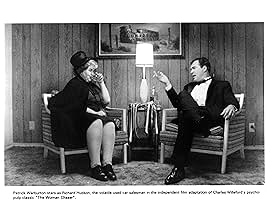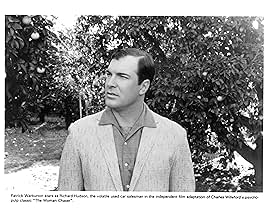Richard Hudson, an inveterate woman-chaser and gifted used car salesman, possesses a pimp's understanding of the ways in which women (and men) are most vulnerable - and justifies his seducti... Read allRichard Hudson, an inveterate woman-chaser and gifted used car salesman, possesses a pimp's understanding of the ways in which women (and men) are most vulnerable - and justifies his seductions with a highly perverse logic.Richard Hudson, an inveterate woman-chaser and gifted used car salesman, possesses a pimp's understanding of the ways in which women (and men) are most vulnerable - and justifies his seductions with a highly perverse logic.
- Awards
- 2 wins & 2 nominations total
Lora Witty
- Mrs. Shantz
- (as Laura Witty)
- Director
- Writers
- All cast & crew
- Production, box office & more at IMDbPro
Storyline
Did you know
- TriviaAccording to the bedside clock, Richard's introductory lovemaking session with Becky lasted 2 minutes, despite his earlier claims to being a fantastic lover.
- Quotes
Becky: Don't you want to kiss me good night?
Richard Hudson: Thanks, I kiss too wetly.
- Alternate versionsOriginal version shown at the Sundance film festival was in black-and-white; later shown on cable in a slightly shorter color version.
- ConnectionsReferences The Big Lebowski (1998)
Featured review
A couple of the actors in this movie have done other things, but if you click on several of them, this is their only screen credit.
They don't act like amateurs. Nor do they look like actors. They look like people.
The director, Robinson Devor--this is his first film--got good performances out of them, and the lead, Patrick Warburton--he's in most scenes, or most scenes cut to him--also does a good job carrying them.
Warburton makes the movie, with his fruity voice, his barrel chest--a chest like Howard Keel--his combination of airy toe-dancer and used-car lot-manager kicking a salesman in the ass, of low-life moneygrubber and reader of T. S. Eliot who listens to Bela Bartok, the genius screewnwiter-director (auteur) who puts together The Man Who Got Away and gets it made, and cuts it so tight, getting the pacing perfect, that it runs four reels instead of six, a good half an hour short, for a feature film, causing him trouble with the philistines in the front office, who wrest his movie from him, causing him to go over the top, come the rest of the way unhinged, lose it.
He wasn't wrapped all that tight to begin with. But there is development, progress, advancement, inexorable dark strange weirdnesses, but with light twists. As you'd expect from Charles Willeford.
The film was shot in color but lit for black and white, then printed in black and white on title stock. Whatever that means. I don't understand the technology.
This caused Devor some problems with distribution, he reports. No matter. The fame of this movie will spread by word-of-mouth, and it will be kept alive by its devoted fans, as Willeford's novels have been.
I think Willeford would have gotten a kick out of this movie. The scenes in the gay bar, Hudson picking up the Salvation Army captain, are a stitch. Dancing with his ballerina mother, who shows us her tits. Even the young Richard Hudson at the pool, where the woman who is interested in him, in the water, in a swimming suit, is not interested in him, on dry land, on his newsboy bicycle.
The bitter truck driver and his tired wife, the young girl with the dog, the helpful Good Samaritan, who is beaten by the mob...his stepfather, his stepsister, the studio boss, the secretary he sends back to the typing pool...Hudson alone in the flickering screening room, with his movie--these are images that stick in one's head.
The retired master sergeant, with his chart, showing sales going down.
I am reminded, not of the early Coen Brothers, but of the early Fellini.
Bravo.
They don't act like amateurs. Nor do they look like actors. They look like people.
The director, Robinson Devor--this is his first film--got good performances out of them, and the lead, Patrick Warburton--he's in most scenes, or most scenes cut to him--also does a good job carrying them.
Warburton makes the movie, with his fruity voice, his barrel chest--a chest like Howard Keel--his combination of airy toe-dancer and used-car lot-manager kicking a salesman in the ass, of low-life moneygrubber and reader of T. S. Eliot who listens to Bela Bartok, the genius screewnwiter-director (auteur) who puts together The Man Who Got Away and gets it made, and cuts it so tight, getting the pacing perfect, that it runs four reels instead of six, a good half an hour short, for a feature film, causing him trouble with the philistines in the front office, who wrest his movie from him, causing him to go over the top, come the rest of the way unhinged, lose it.
He wasn't wrapped all that tight to begin with. But there is development, progress, advancement, inexorable dark strange weirdnesses, but with light twists. As you'd expect from Charles Willeford.
The film was shot in color but lit for black and white, then printed in black and white on title stock. Whatever that means. I don't understand the technology.
This caused Devor some problems with distribution, he reports. No matter. The fame of this movie will spread by word-of-mouth, and it will be kept alive by its devoted fans, as Willeford's novels have been.
I think Willeford would have gotten a kick out of this movie. The scenes in the gay bar, Hudson picking up the Salvation Army captain, are a stitch. Dancing with his ballerina mother, who shows us her tits. Even the young Richard Hudson at the pool, where the woman who is interested in him, in the water, in a swimming suit, is not interested in him, on dry land, on his newsboy bicycle.
The bitter truck driver and his tired wife, the young girl with the dog, the helpful Good Samaritan, who is beaten by the mob...his stepfather, his stepsister, the studio boss, the secretary he sends back to the typing pool...Hudson alone in the flickering screening room, with his movie--these are images that stick in one's head.
The retired master sergeant, with his chart, showing sales going down.
I am reminded, not of the early Coen Brothers, but of the early Fellini.
Bravo.
- jacksaunders
- Oct 24, 2000
- Permalink
Details
Box office
- Budget
- $1,200,000 (estimated)
- Runtime1 hour 30 minutes
- Color
Contribute to this page
Suggest an edit or add missing content

























